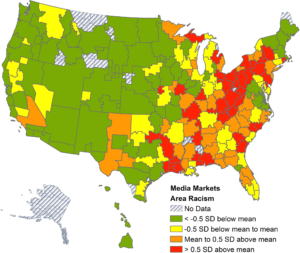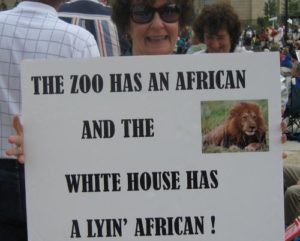More specifically, Black people who live in areas with the highest levels of racism have higher mortality rates.
That’s the takeaway from a new study published David Chae, an assistant professor of epidemiology and biostatistics at the University of Maryland School of Public Health, and a team of co-authors. Chae and his team determined how racist a geographic area was by how frequently people in that area used the n-word in Google searches between 2004 and 2007. Chae said this method is particularly effective because people don’t self-censor in their own homes. Because most people are wary of appearing racist to outsiders, most studies that measure racism have to figure out clever ways to trick people into answering questions that researchers use to try to glean levels of racism.
Areas that had the most searches that included the n-word had the highest mortality rates among African-Americans. The correlation held up even when the researchers adjusted for the size of the Black population and for the fact that Black people have higher poverty rates and suffer more from chronic diseases. The study was published in the scientific journal PLOS ONE.
Pervasive racism is “a social toxin that, over time, leads to premature mortality,” Chae told The Huffington Post. “Racism gets under the skin and becomes embodied. It chips away at you.”
Chae compared racism to an environmental hazard like pollution.
While many studies have traced all the deleterious effects of racism on the lives and health of Black people, this is the first to use such an objective measure of racism mapped across the entire country and find such a strong mortality correlation. Since the results still stand after the researchers control for socioeconomic factors, the conclusion drawn is devastating: Black people cannot escape the harmful effects of other people’s racism; the racists who surround you ultimately have the power to slowly kill you with hate.
It is chilling realization for a population that has had to struggle against hate for centuries, finally coming to believe that a good education and a well-paying job would provide a measure of insulation from the racism that swirls around them. The anger that has been on display in communities like Baltimore and Ferguson has been prompted by the knowledge that death is more likely to be visited on Black people by law enforcement simply because of skin color.
But this new study makes it clear that Black people’s enemies extend far beyond police departments.
More than anything else, what the study points to is the need for Black people to find strategies, methods, processes, to be able to reduce their stress levels when confronted with racism. It doesn’t appear as if racism is going to be eradicated anytime soon, but the Black community must find ways to survive, and even thrive, in the midst of it. It is not acceptable to continue to let the racism of others result in higher Black mortality. The racists can’t win.
The study found that living in an area characterized by a one standard deviation greater proportion of racist Google searches is associated with an 8.2 percent increase in the all-cause mortality rate among Blacks. This amounts to more than 30,000 deaths every year among Black people across the country. After the researchers adjusted for socioeconomic factors like education and income, the mortality rate increase dropped to 5.7 percent, which is still significant. The researchers pointed out that the greater levels of poverty and lower levels of education of many Black residents in an area “are also influenced by racial prejudice and discrimination and therefore could be on the causal pathway.”

Chae and his team found strong correlations between an area’s racism and incidences of heart disease, cancer and stroke, which are all leading causes of death among the Black population.
“As a source of stress experienced across the life-course, racism contributes to ‘weathering’ or accelerated declines in health across biological systems caused by the mobilization of resources to meet environmental demands, thus potentially impacting a range of health outcomes,” the researchers wrote. “For example, experimentally manipulated experiences of discrimination have been associated with cardiovascular reactivity, particularly in response to scenarios that were motivationally ambiguous. We found robust associations between area racism and heart disease, cancer, and stroke, leading causes of death among Blacks. Racial disparities in mortality from these diseases may be influenced by racism through biobehavioral channels engaged in the threat response. As a source of chronic psychosocial stress, repeated racism may result in a heighted pro-inflammatory state that can have particularly detrimental consequences for the etiology and progression of cardiovascular and other immune disorders. Studies on discrimination have found evidence for adverse consequences for hypertension, atherosclerosis, and their inflammatory mediators. A recent study found that racism-related factors may also be associated with accelerated aging at the cellular level.”
Chae told the Huffington Post that he got the idea for the study after reading a New York Times article that showed Barack Obama underperformed in the 2008 presidential election in areas that had the highest Google searches for the n-word.
“I was really intrigued by the study because it’s an indirect way of researching attitudes,” Chae said.
Chae emailed the study’s author, Harvard economics professor Seth Stephens-Davidowitz, and suggested they collaborate on a study comparing Google searches with Black mortality rates.
A map that accompanies the study shows the areas that had the highest Google searches containing the n-word. In the northeast, the areas with the highest numbers of searches include southern New Jersey, virtually all of Pennsylvania and West Virginia, much of upstate New York, and most of New Hampshire. In the midwest, the highest areas are most of Ohio, parts of northern Michigan (including most of the Upper Peninsula), and parts of Missouri, Oklahoma and Kansas. In the South, the highest areas are coastal South Carolina and coastal North Carolina, southern Alabama, much of Mississippi, much of Louisiana, and much of Missouri and Kentucky.
The lowest numbers of n-word searches were in Maine, the Washington, DC area, most of Texas, and much of the North and Midwest west of Wisconsin and Nebraska.



